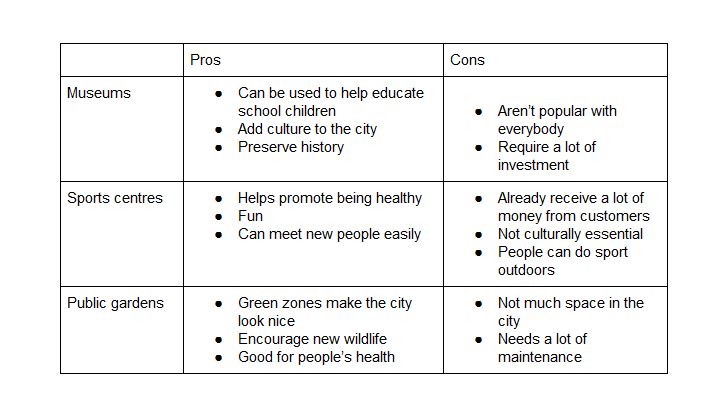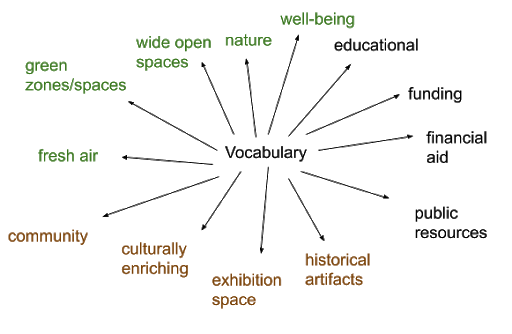TASK: Write an opinion essay related to fashion:
"Fast fashion and pollution"
STEP 1: Pros and cons
STEP 2: Find vocabulary related to the topic.
"Fast fashion and pollution"
STEP 1: Pros and cons
STEP 2: Find vocabulary related to the topic.

Take ten minutes to lay out your ideas. Make a pros and cons list. Here’s some things you might come up with when writing, for example, about museums and sport centres.
The essence of a good essay is a clear structure.
Here you want to introduce the topic in your own words. Your first line should also grab the reader’s attention, then you should paraphrase the question. Finally, try using a statistic or a rhetorical question. This will make them want to read on, right?
Discuss the first option you’ve chosen. Include a good topic sentence and remember to give reasons for your answer. Describe some of the advantages, and even some of the disadvantages too. This will give a well-balanced argument.
Here’s where you introduce the second option. Again, try to present both sides of the argument and give reasons for your ideas. Gradually work towards the conclusion.
State your final opinion. This should be a summary of the rest of the essay and point clearly to which option you think is the most important. Do not introduce any new arguments at this stage. The conclusion is where you tie-up any loose ends.
This is an advanced piece of writing, so make sure your choice of language reflects it. You will get marked for accuracy, however, occasional errors can still be present as long as they do not impede understanding. So don’t play it too safe. This is your opportunity to show what you can do, so take some risks and have fun with it!
In the writing paper you should use a range of vocabulary, including less common lexis. Brainstorm some vocabulary related to the topic. Take your time to think of nouns and compound nouns that you know at C1 level. Really let your vocabulary sparkle.

No one likes a broken record. Find synonyms for simple words. You want to use a variety of language, and try not to repeat yourself too much. Check out these different ways of saying the same thing:
advantage = benefit, positive, upside
disadvantage = downside, drawback
effect = influence, impact, result, outcome
problem = issue, challenge, difficulty, obstacle, setback, complication
important = valuable, essential, beneficial
expensive = costly, dear, high-priced, extortionate
cheap = inexpensive, affordable, economical
big = great, large, sizeable, considerable, wide, vast
small = slight, tiny, little
Experiment with different grammatical forms. At this level you’re expected to have a good grasp on the grammar. You should use a range of simple and complex grammatical forms with control and flexibility. So challenge yourself with some of these…
To make your essay flow it’s best to use some key phrases. These will link all your ideas together, and help it sound semi-formal. Take a look at the expressions below. Why not use some in your next essay?
It is often said that…
Many people feel that…
We live in an age when..
More and more…
Firstly, secondly, thirdly…
On the one hand…
In addition…
What is more…
For example…
For instance…
As a case in point…
In contrast…
On the other hand…
Alternatively…
However…
All things considered…
As far as I’m concerned…
In light of the above…
When writing your essay, bear in mind what you’ll be marked on:
Have you answered all parts of the question? Is everything relevant to the question?
Is the style and tone appropriate? Remember it should be semi-formal and neutral.
Does it follow a logical order? Have you used paragraphs and linking devices?
Are you using a variety of grammar and vocabulary? Is it accurate?
Now your masterpiece has come together. Remember to take time to check your work. Here’s the official Writing Checklist from Cambridge Assessment English. And our list of the most common mistakes:
Avoid contractions (I’m, they’re, we’re) as this is a formal writing.
Don’t use first person pronouns (I, my, our, us).
Practise under timed conditions.
Use model answers to practise fixed expressions.
2.-I …………………………….….. (NOT SPEAK) to Jane for ages. I’m going to phone her. (CORRECT TENSES)
3.-The last time I saw him was on Monday. (REWRITE USING “SINCE”)
4.-The manager offered me a new position in the company. (CHANGE TO TWO FORMS OF PASSIVE)
5.-I spent too much money and now I regret it. (REWRITE USING A MODAL VERB)
6.-The new optician is going to check my eyes. (CHANGE TO THE CAUSATIVE FORM)
7.-For two weeks. (WRITE A QUESTION)
8.-I am really worried about the crisis because I don’t have a lot of money. (REWRITE USING A CONDITIONAL)
9.-Next Monday our school is closed because of the bank holiday. (REWRITE USING A MODAL VERB)
10.-Don’t drive so fast. This is my advice. (REWRITE USING A MODAL VERB) (REWRITE USING A CONDITIONAL SENTENCE)
11.-She won’t go on holiday if she doesn’t have enough money. (REWRITE USING “UNLESS”)
12.-She never worked as a doctor because she didn’t finish her degree. (REWRITE USING A CONDITIONAL)
13.- When I arrived at the store I realized I ………………………..(forget) my credit card. (CORRECT TENSE)
14.-With this effective course, we promise that by the end you ………..…………….. (LEARN) 500 new words. (CORRECT TENSE)
15.-An expert decorated Sally’s new flat. (CHANGE TO THE CAUSATIVE FORM)
16.- Next weekend I’m going to Glasgow. My sister lives in Glasgow. (JOIN USING A RELATIVE SENTENCE)
17.- John is one of my closest friends. I have known John for eight years. (JOIN USING A RELATIVE SENTENCE)
18.- When I lived in the UK I hated driving on the left. (REWRITE USING USED TO/WOULD OR BOTH)
19.-This second-hand car has been sold for 3000 euros. (REWRITE IN THE ACTIVE VOICE)
20.-Mary sent a very well-designed CV. However, she didn't get the job. (CONNECTORS.REWRITE STARTING BY "Although...")
21.-Mary sent a very well-designed CV. However, she didn't get the job. (CONNECTORS.REWRITE STARTING BY "Despite / In spite of...")
22.-While the students ……………………. (DO) their test, the principal entered the room. (CORRECT VERB TENSES)
23.-The optician has checked my eyes. (CHANGE TO CAUSATIVE FORM)
24.-People think mixing vaccines is not a good option. (2 IMPERSONAL PASSIVE)
25.-By this time next month we …………………….. (end) our exams and we …………………. (enjoy) our holidys. (CORRECT VERB TENSES)
| The train had left when we arrived. | ||
| past | present | future |
| Train left at 9am. | ||
| We arrived at 9.15am. | ||
| past perfect tense | present perfect tense | |||||
| had | done | > | | have | done | > | | |||||
| past | now | future | past | now | future | |